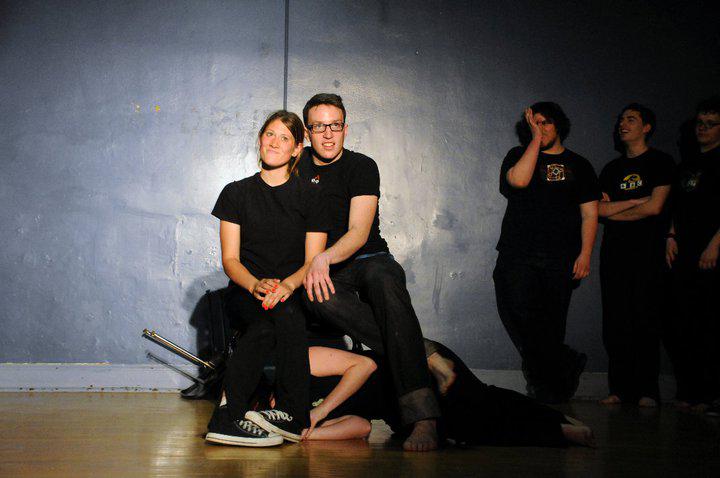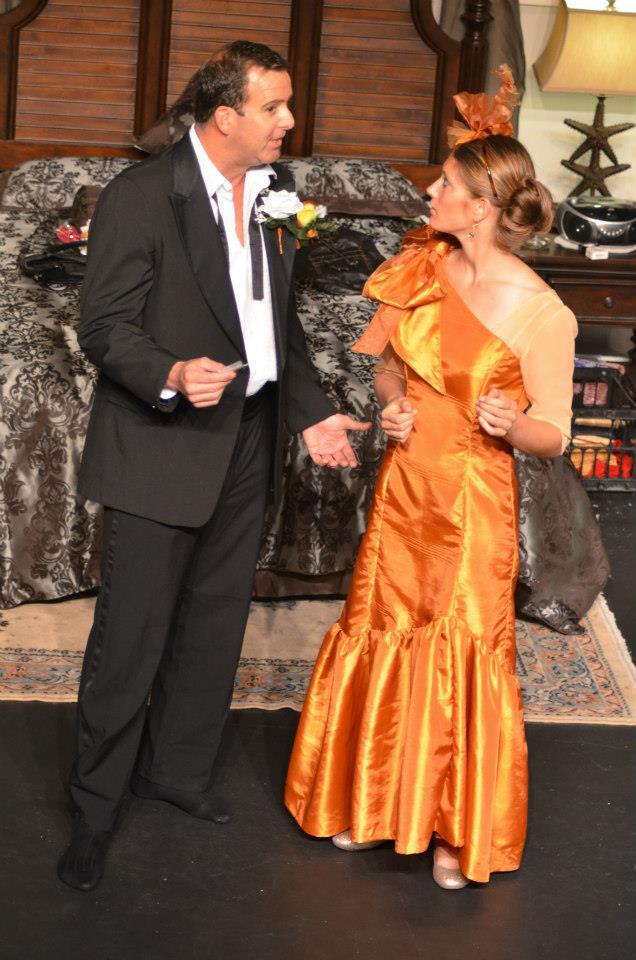Theatre’s Role in My Anxiety Management
Anxiety removes me from the present. The scary truth is that anxiety never really dissipates, but in all honesty, I wouldn’t want it to. Nerves and fear are the body’s self-defense mode. Sometimes self-preservation gets carried away, though. This is when anxiety disorder kicks in and one has to learn to cope with the stimulants. I’ve found one of the best methods for training my mind to live in the here and now is theatre.
Through my work in improvisation, devised theatre, and stage and film acting, I’ve gained insight into my own anxiety struggle. Theatre is as much a testament of my talents as it is an homage to a tenacity to take care of my mental health. Five basic tenets of acting can be directly applied to coping with anxiety. Mindful listening, group mind, character work, awareness, and acceptance and commitment all enter the playing field for an actor and a person with anxiety.
Mindful Listening
Part of the coping process entails hearing my own thoughts and listening to my body language. As an actress, I am required to pay attention to the script, not only to pick up on cues, but also to engage in reacting. A good actor doesn’t just act; a good actor reacts. A strong performance is filled with on-stage chemistry, which banks on interactive, attentive listening; thereby pulling the actor into the here and now. When I talked to a caterpillar and the Cheshire Cat in Alice in Wonderland, I was present in that moment of scripted and incidental reality, not the tried and true reality of the bustling world around me.

Group Mind
The most beautiful state of mind I have ever achieved in life has not been in moments of self-meditation, but rather in the rare, honed skill of group mind. Three years in an improv comedy troupe taught me the magic of this human connection, an upper tier of mentality acquired only with immense practice. In this collective conscious, a sort of telepathic intuition is achieved, allowing actors to think and move in sync with each other, devoid of any spoken instruction. Troupe members bestow their trust, knowledge and energy to each other resulting in the witty, fluid, fast-paced dialogue that new theatre patrons swear must be scripted. It is group mind that allows one actor to mutate into a wilting glob and lets another actor instinctually know that she's not Flubber or Gumby, but the Wicked Witch of the West.
Group mind makes improvisational comedy click by shifting the focus from individuals to the troupe as a whole. Like meditation, it relies on inner focus but goes a step further by equally relying on external focus. It seems counterintuitive to suggest this is even possible, but the amount of directed attention projected into group mind—until it reaches a level as natural as one’s breathing pattern—draws me away from myself. When I am focused on my own inhalations, making them rhythmically collide with my fellow actors, there is no room for worry and negative thoughts.
Character Work
In order to be convincing as an actor, performers create a background story. I research one if it is a biographical character; I create one if it is a fictional character. The focus is shifted from my personal world to the inner world of my character. This is the reality that invades my mind, and again, there is no room for fear or anxiety.
Character work is not just a matter of delivering lines. It is in the way I walk, pick up a glass, or move a strand of hair out of my eyes. When I performed the role of Lt. Cdr. Joanne Galloway in A Few Good Men, I sat straighter in my chair and avoided the eye rolling that has become second nature to me. As Nurse Kelly in Harvey, I affected an angelic voice I didn’t know was in my vocal range. Heck, I even learned knitting and Hebrew for the stage. In each moment, I was invested in the character in both mind and body. What I did in the present was affected not by my own past, but the past of my character. I knew the reason for everything my character did, scripted or not.

Awareness
Acting requires being aware of my character and my surroundings. It employs analysis of the situation at hand and responding accordingly. Many times, my thoughts and fears are projections into the future linked to something in my past. While my fight or flight mode is only kicking in to protect me, assessing the reality offers proof that my fears are only perceived.
When I played astronaut Judith Resnik in a play about the Challenger space shuttle disaster, awareness was a persistent state of mind. Though I knew historically what happened, my character loaded into the space shuttle excited, free of premonition. It was only after the explosion when the orbiter started falling to earth that my character embraced real fear.
Acceptance and Commitment
From what the director tells me to do to what the playwright has written, acceptance and commitment play a dominant role in my work. They are also integral in an anxiety struggle. As worrisome thoughts start entering my mind, suppressing them only causes them to bubble up more forcefully later. Similarly, refusing to acknowledge direction in a play creates disharmony—and likely just leads to the same notes over and over again.
Acceptance and commitment are also important with fellow actors. In improv comedy, we practice saying “yes, and.” If a troupe member introduces me at an on-stage improv party as “my friend the robotic spider,” I do not refute being a robotic spider. I become the robotic spider, and then some. By accepting and committing to the idea—perhaps pretending to spin a web and asking partygoers to oil me—I give life to the scene. If I deny the setting or character traits I’ve been gifted, the scene dies before it even takes off.
Stifling worrisome, albeit self-preserving, thoughts sucks the life out of me, much like in a scene. Inevitably, the problem just heightens. But noticing their existence (acceptance) and choosing to focus on the original non-invasive thought instead (commitment) helps me avoid remaining stagnant. Under the spotlight, I step out of my shoes, body and mind. For a few hours at least, I am free of my anxiety. The stage is not a microcosm of the world around me; it becomes my reality.


Comments
The article is just the start of the conversation—we want to know what you think about this subject, too! HowlRound is a space for knowledge-sharing, and we welcome spirited, thoughtful, and on-topic dialogue. Find our full comments policy here